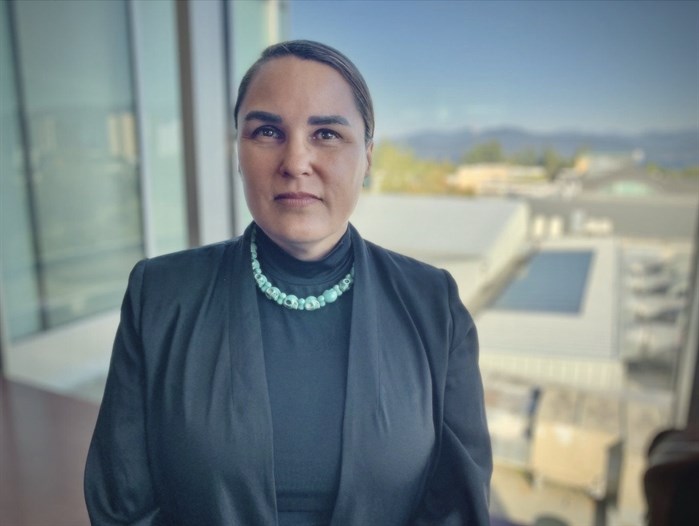
First Nations business leader Carol Anne Hilton spoke on the Indigenous perspective and solutions at the UBC Climate Economy Summit.
Image Credit: Rochelle Baker, Local Journalism Initiative
September 23, 2023 - 11:30 AM
Indigenous communities are leading Canada's clean energy boom, "and doing that with a slanted table," says a First Nations business leader working to build a successful climate economy that incorporates Indigenous Peoples and their world views.
Within one generation of reclaiming a seat at the economic table, Indigenous Peoples are driving key outcomes in the national economy and climate action, Carol Anne Hilton, CEO of the Indigenomics Institute, told business experts, academics and government leaders gathered at the University of British Columbia last week.
Indigenous businesses or companies co-own or lead 20 per cent of Canada's electric infrastructure, and are the largest asset owners outside of utility corporations, she noted.
Yet Indigenous people still lack influence over policy, access to capital and the building and design of Indigenous project development and have little sway over investment structures.
“The reality is this country was formed specifically on the structures of economic isolation of Indigenous people,” Hilton told academic, government and industry experts gathered to discuss the opportunities and risks on the path to achieving net-zero greenhouse gas emissions.
The systemic and deliberate exclusion of Indigenous people and their worldview has resulted in existential threats to the environment and economy, she noted.
The development of a successful climate economy must involve Indigenous people and include their knowledge and values, Hilton stressed.
The Nuu-Chah-Nulth people have 10,000-plus years of potlatch tradition, which involves the ceremonial redistribution of wealth founded on relationships and responsibility tied to natural law, Hilton said.
These “Indigenous economic design principles” are driven by a worldview and values embedded in generational thinking, Hilton said.
The Indigenomics Institute is working on the foundation and economic design of a $100-billion national Indigenous economy, she noted.
Hilton said she was shaped as a young leader by the War in the Woods, a massive uprising and blockade in the early 1990s against old-growth logging in Clayoquot Sound on Vancouver Island.
“Indigenous people taking their seat — and saying the requirement for our worldview, the requirement for our Indigenous knowledge are the solutions — essentially reshaped the B.C. forest industry,” she said.
Additionally, Indigenous ways of knowing provide the framework to support economic and social outcomes, she stressed.
The value of responsibility inherent in the Indigenous worldview was supplanted by a regulatory system with poor results, Hilton told Canada’s National Observer following her talk.
“Whether that's water, forestry, fisheries, the externalization of responsibility has become entirely industrialized, regulated, measured,” she said.
“But the concept of relationship and responsibility to ourselves, to the resource and to future generations, you will never see that language within regulatory systems.”
Incorporating the perspective of Indigenous people and how they relate to one another with “life at the centre” is a solution for the desired outcomes of the climate economy, she said.
“It's taking Indigenous-led conservation practices and that alignment within our economies, that's really where the opportunity is.”
— This story was originally published by Canada's National Observer.
News from © iNFOnews, 2023